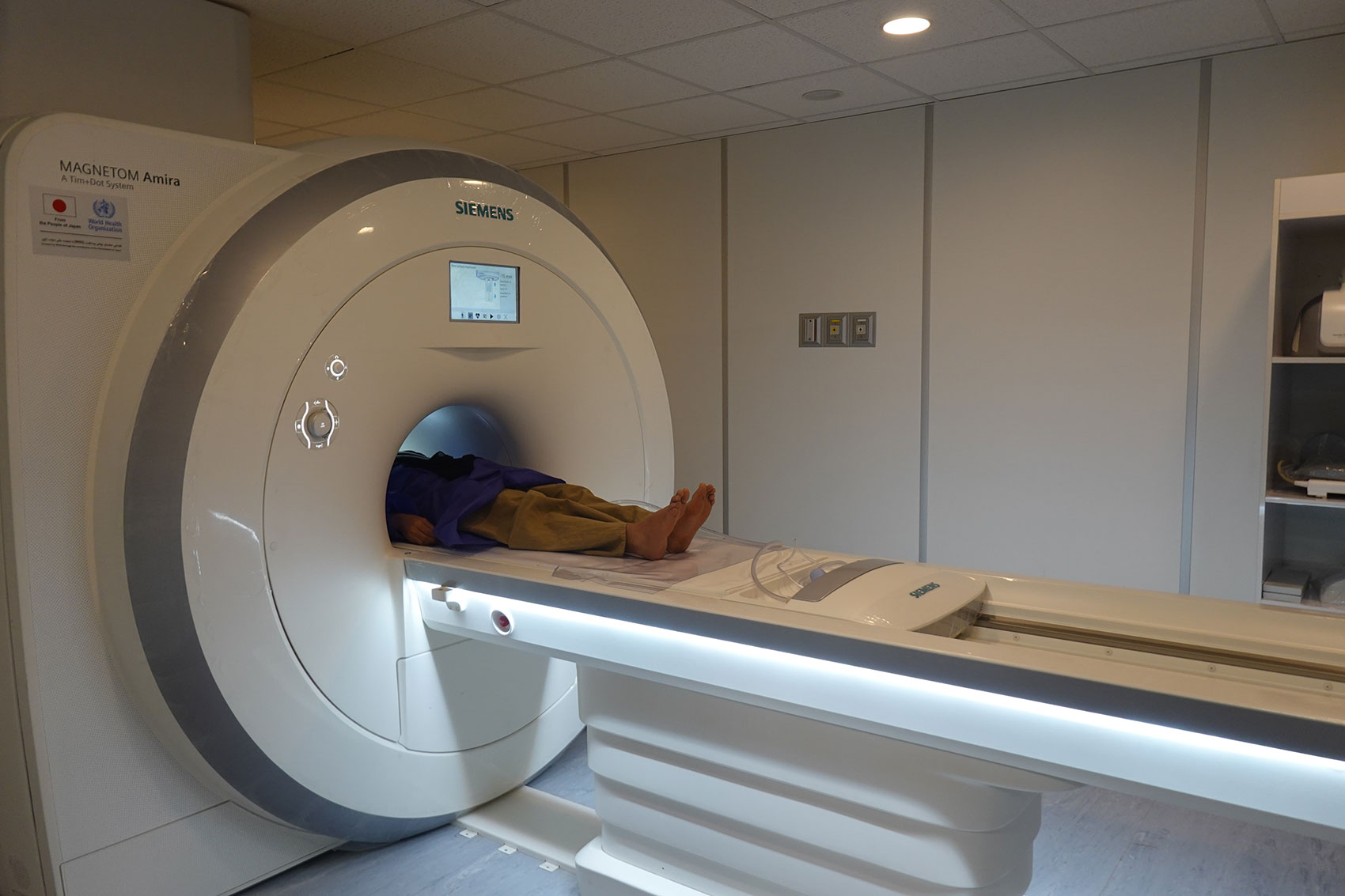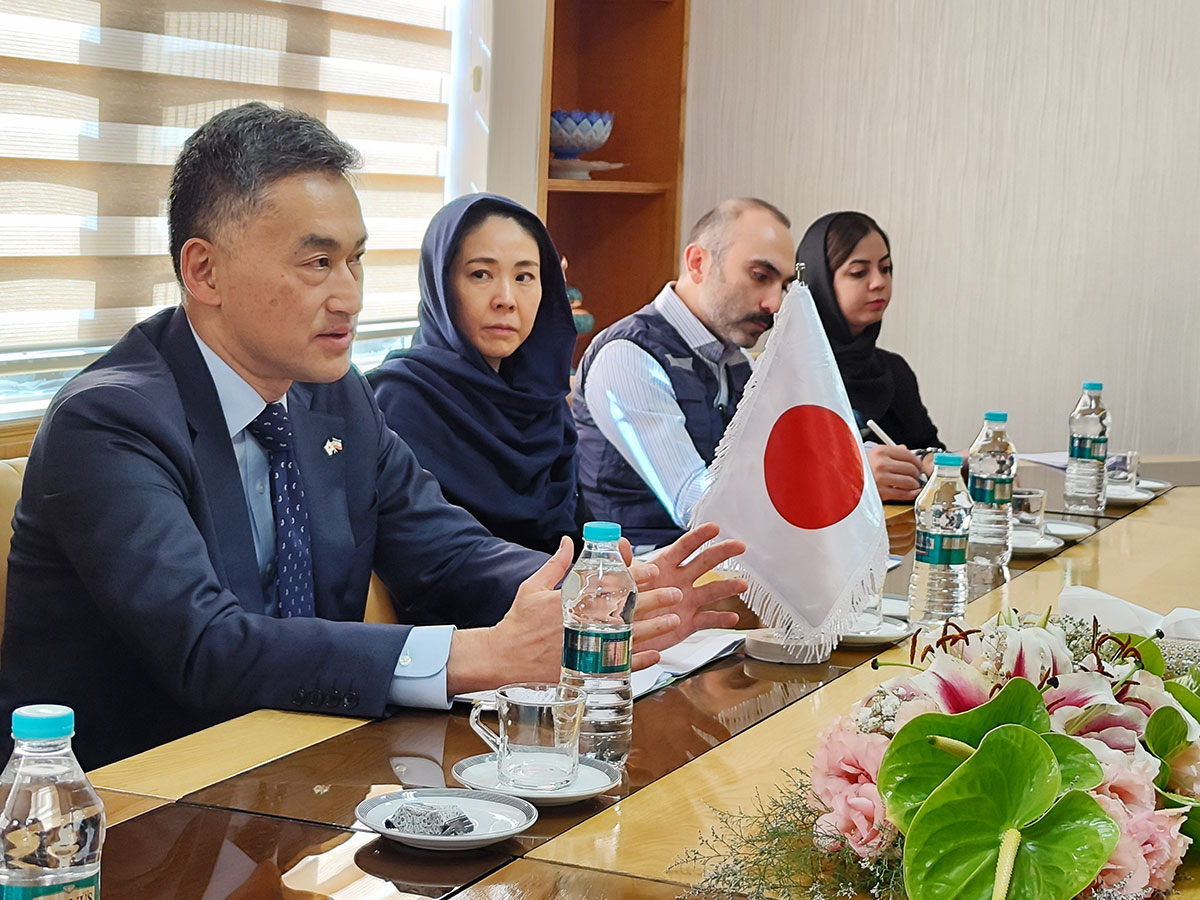 23 June 2024, Tehran, Islamic Republic of Iran – Since the arrival of a new magnetic resonance imaging (MRI) machine in Hajar Hospital, Shahrekord, cancer has been detected early enough in dozens of patients to allow them to receive less aggressive treatment – ultimately saving their lives. It is one of 6 state-of-the-art MRI machines generously funded by the Government of Japan and strategically placed in key referral hospitals identified by the Iranian Ministry of Health and Medical Education.
23 June 2024, Tehran, Islamic Republic of Iran – Since the arrival of a new magnetic resonance imaging (MRI) machine in Hajar Hospital, Shahrekord, cancer has been detected early enough in dozens of patients to allow them to receive less aggressive treatment – ultimately saving their lives. It is one of 6 state-of-the-art MRI machines generously funded by the Government of Japan and strategically placed in key referral hospitals identified by the Iranian Ministry of Health and Medical Education.
Representatives of WHO and the Embassy of Japan in the Islamic Republic of Iran visited Hajar Hospital on 13 June 2024 to witness the impact the MRI machine has had since its donation in October 2023. Before, patients in Shahrekord and nearby districts had to travel long distances for diagnostic services. Now, access to an advanced 1.5 Tesla MRI machine is available at Hajar Hospital and at Kosar Hospital, Semnan; Pasteur Hospital, Bam; 12 Farvardin Hospital, Kahnooj; Imam Ali Hospital, Andimeshk; and Shohada Hospital, Neyriz.
The MRI project was devised at the peak of the COVID-19 emergency – when the Islamic Republic of Iran was one of the hardest hit countries in the Eastern Mediterranean Region – to overcome diagnostic limitations in the country. While the public health emergency phase of the pandemic is over, the coronavirus continues to circulate. The generously donated MRI machines will continue to address the acute diagnostic needs of COVID-19 patients and strengthen medical imaging capabilities to care for patients with long COVID (post-acute sequelae of COVID-19). The machines can also be used to help diagnose a variety of other diseases and injuries unrelated to COVID-19.
 Improved disease prognosis, as seen at Hajar Hospital, shows the significant progress made in giving underprivileged populations access to the advanced diagnostic capacity of an MRI machine. It also reflects the commitment of the Iranian health system to enhance the overall quality of patient care, including by building on gains from the COVID-19 pandemic. The country has great health system capacity, but there are also vulnerabilities, mainly in rural areas. These are associated with meeting the needs of historically marginalized populations and the continuous influx of Afghan refugees.
Improved disease prognosis, as seen at Hajar Hospital, shows the significant progress made in giving underprivileged populations access to the advanced diagnostic capacity of an MRI machine. It also reflects the commitment of the Iranian health system to enhance the overall quality of patient care, including by building on gains from the COVID-19 pandemic. The country has great health system capacity, but there are also vulnerabilities, mainly in rural areas. These are associated with meeting the needs of historically marginalized populations and the continuous influx of Afghan refugees.
“In a world where inequalities continue to hinder the achievement of universal health coverage, we have seen great value derived from the donation of the MRI machines, especially in vulnerable areas of the country, where access to this highly sophisticated technology is vastly improved. More people now have more timely access to diagnostics, which will ultimately lead to early initiation of treatment. As a result, their overall medical care can be enhanced,” said Dr Mikiko Senga, WHO Deputy Representative and Health Emergencies Lead of the WHO Country Office in the Islamic Republic of Iran.
“We are immensely grateful for the Government of Japan’s support in enhancing the resilience of the Iranian health system,” emphasized Dr Syed Jaffar Hussain, WHO Representative and Head of Mission in the Islamic Republic of Iran. “These MRI machines will significantly improve the Islamic Republic of Iran’s diagnostic capabilities, offering more timely and accurate health services to its people. We believe this joint WHO–Japan project will have a lasting impact on the health and well-being of vulnerable populations in the country, including refugees from Afghanistan who reside in deprived areas of the Islamic Republic of Iran.”
 “I visited Hajar Hospital in Shahrekord to confirm the operating status of the MRI provided by Japan. I could observe that this equipment is already helping local healthcare system. The MRI is used for various diagnostic purposes, including detecting severe cases of new coronavirus infection, early detection of cancer, bleeding from heart attacks and strokes, identifying disabilities caused by accidents and other causes, and monitoring disease progression”, said His Excellency Mr Tamaki Tsukada, Ambassador of Japan to the Islamic Republic of Iran.
“I visited Hajar Hospital in Shahrekord to confirm the operating status of the MRI provided by Japan. I could observe that this equipment is already helping local healthcare system. The MRI is used for various diagnostic purposes, including detecting severe cases of new coronavirus infection, early detection of cancer, bleeding from heart attacks and strokes, identifying disabilities caused by accidents and other causes, and monitoring disease progression”, said His Excellency Mr Tamaki Tsukada, Ambassador of Japan to the Islamic Republic of Iran.
“Health and healthcare are fundamental sector of a country and both Iran and Japan are committed to improving the quality of healthcare services for their citizens. We hope that this MRI contribute to the improvement of health services”.
The life-saving impact of this collaboration epitomizes a successful international partnership to enhance essential health services, including disease detection, and ultimately work towards universal health coverage. Further, the installation and operation of the MRI machines have been made possible through the partnership between Shahrekord University of Medical Sciences and the Ministry of Health and Medical Education.
On their visit to Hajar Hospital, the delegations from WHO and the Embassy of Japan were joined by Dr Ahmad Rastineh, Shahrekord’s Member of Parliament, and Mr Gholam-Ali Heidari, Governor of Chaharmahal and Bakhtiari Province.


